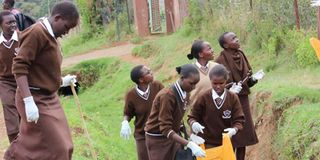Premium
Why we should strive to celebrate Father’s Day like Kapropita Girls

A Form Three parent at Kapropita Girls High School in Baringo Central giving a flower to a student during the fathers only academic day on June 11, 2022.
What you need to know:
- The surprise this year, for me, is Kapropita Girls’ “Fathers only” academic day, which is still a lively talking point, days after it was held last Saturday, June 11.
- I do not know if Ms Jennifer Kiprono, the Principal, and her team had Father’s Day in mind when they sent out the unique invitation exclusively to the male parents and guardians of their students.
The third Sunday in June, like tomorrow’s 19th this year, 2022, is conventionally observed as Father’s Day. It is a kind of balance to Mother’s Day, marked on the second Sunday of May.
In my quick search about Father’s Day, I learnt that an American woman, named Sonora Smart Dodd was the brain behind its proposal and promotion, leading to its first celebration in 1910.
One other aspect of Father’s Day is that, apart from the American version mentioned above, there are other versions celebrated on different dates in various countries. In many Christian countries, for example, Father’s Day is marked on March 19, the traditional memorial day of Joseph of Nazareth, husband of Mary and Christ’s earthly guardian.
The central theme of Father’s Day, however, is the parental dignity and responsibility of male parents. To these we should add the joy, pride and satisfaction of positive fatherhood.
I have many cherished memories of the many Father’s Days I have celebrated since I became a parent decade ago. Sometimes your children may surprise you with a lavish delivery of goodies to your remote country cottage. The element of surprise is the best part of relishing the father-child relationship, for those of us with grown-up children.
The surprise this year, for me, is Kapropita Girls’ “Fathers only” academic day, which is still a lively talking point, days after it was held last Saturday, June 11. I do not know if Ms Jennifer Kiprono, the Principal, and her team had Father’s Day in mind when they sent out the unique invitation exclusively to the male parents and guardians of their students.
Anyway, by coincidence or design, the invitation and the subsequent event, which I understand went very well, has focused our attention on Father’s Day, and more specifically on the role of fathers and other father-figures in the parenting of children.
Before I plunge into the conversation about the Kapropita event, I should make a declaration. I have no vested interest in Kapropita Girls or any of its population, apart from the general mwalimu’s indelible concern with all matters educational. Of course I have known about and respected Kapropita Girls as a premier educational institution in Baringo County and in the country.

Kapropita Girls cleaning Kabarnet town in Baringo County. The school held a ‘fathers only’ academic day last Saturday.
It particularly came to my attention in the early 1980s, in my drama festival adjudicating days, when one of the girls there won the prestigious best actress award with a scintillating performance in a play whose title I have now forgotten.
That said, I noted that those who criticised the “fathers only” invitation had two main reasons for their objections. The first was that it was insensitive to the tragedy of those, like orphans, who have no fathers. Secondly, and more pointedly, it was embarrassing to the many single-mother families.
Since I was not a party to the processes that culminated in the invitations, I cannot presume to defend or justify them. But, to me, the objections smack of a simplistic political correctness.
Losing a parent and being orphaned is certainly a tragedy, and the affected child should be helped to cope with it through adequate counselling and social support. The loss of a father or mother should not be hushed up and hidden from the child by not mentioning it or pretending that it never happened.
Nor should single parents and their children be embarrassed at their status by the mention of the presence of a father (or mother) in other families. These are realities of life, and what the child needs is a simple and frank explanation of his or her status and the reasons behind it. Refraining from mentioning two-parent families, even if it were possible, would not be the solution or accommodation of alternative family structures.
There is also the proposition that, regardless of the core structure of a child’s immediate family, exposure to male and female approaches to life is beneficial to the child. In the two-parent families, the mother and father team may be enough to provide this exposure.
In the alternative-structure families, the single parent has to seek the supplementary exposure for her or his child. This is where the role of father-figures or mother-figures comes in.
Uncles, aunts and other family members were the primary recourse in our extended families. Alternatively, tried and trusted friends can play these roles with benefit to all. Growing up in a single parent family should not mean insulation from the experiences and approaches of the missing father or mother.
The sterling value of the Kapropita experiment, however, is that it reminded us fathers of the importance and necessity of playing our full role in the parenting of our children. We teachers, whether in Machakos like me or in Kapropita like Principal Kiprono, witness fathers’ parenting deficiencies every day. Whether it is academic days, discipline cases or sickness, it is invariably the mothers that come trudging to the school to deal with the situation.
Where, invariably, are the fathers? Oh, they are too busy struggling to put bread on the table. They are caught up in high matters of state, defending freedom of speech and the rights of the African child.
Even within the home, it is the mother who is left to help with the homework, while cooking, washing the baby and coping with the thousand and one chores around the house. The father is busy watching, on TV, the latest developments in the Ukrainian war. When will he ever find quality time for his children? When will he be there for them?
A gentle invitation, like the Kapropita one, is a subtle reminder to all of us fathers that there is a lot more to parenting than merely begetting children and providing them with shelter, food, clothing and school fees. Be there for them, listen to them, laugh with them. In these human interactions you will probably find the value, the pride and joy of fatherhood. This, apparently, is what many of those at Kapropita Girls discovered as they honoured the “fathers only” invitation.
Happy Father’s Day!
Prof Bukenya is a leading East African scholar of English and [email protected]





